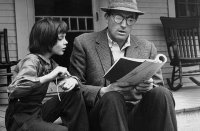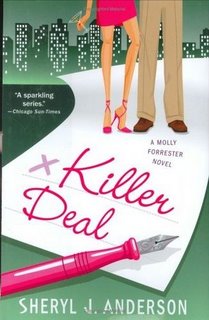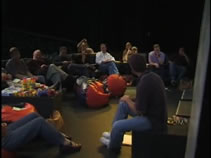This essay was written in the fall of 2001 for publication in Transposition: The Journal of the Christian Performing Artist's Fellowship.It was a several days after.
We had spent two days glued to the television, unable to turn away from the visual barrage of the tragedy, perhaps as a reflection of the psychic barrage that we knew we couldn’t close our eyes to.
We then spent time in that emotional blank wall, systems shutting down from overload.
But our leaders said to get back to work.
So we tried that.
And that’s when I found my wife, sitting on our bed crying. And I understood why she cried. How could we go back to work when our work seemed so irrelevant?
We are artists. Not firemen, policemen, paramedics, doctors or nurses. Not National Guardsman, Marines, Army engineers, construction workers or Red Cross Volunteers. We are artists. And not just any artists, but the silly kind. My wife is an actress, dreaming of being a cartoon voice someday. And I was in the middle of writing a video script about a vegetable who wants to be a superhero. We were entertainers. And what is the relevance of art, of entertainment, after September 11th?
The question isn’t a new one, just new to us. Out of the misery of captivity, the Psalmist writes in Psalm 137:
“By the rivers of Babylon we sat and wept when we remembered Zion. There on the poplars we hung our harps, for there our captors asked us for songs, our tormentors demanded songs of joy; they said, ‘Sing us one of the songs of Zion!’ How can we sing the songs of the Lord while in a foreign land?”
How can we perform in a tragedy laden land?
Of course some art made itself immediately relevant. The doleful music played under the montages of images from ground zero, putting to language what words could not. The overtaxed bagpipers, culling a universal mourning from specific funeral after funeral. The brilliant, lonely line of Taps, a singular call of remembrance for individuals forever united by one date.
And then there was the art giving solace to those involved in the rescue operation, and those facing the reality of their personal losses. We all heard of William Harvey from Juilliard, and how he went to the armory housing the relief workers. There he played what he could recall of Tchaikovsky, Vivaldi, Dvorak and many others. His story moves us, because he saw the unexpected yet undeniable value that the music gave to those whose souls needed such a gift.
And what of those who aren’t in New York or Washington, to lend comfort to those in those cities? And what again of those suffering who are not at ground zero? An entire nation and beyond was hit by that tragedy. An entire nation and beyond looked for healing.
And so art was given. We sang along with CNN as a national prayer service was held. We listened in on a concert, reaching out to our brothers and sisters by sharing their song. We substituted “Take Me Out to the Ballgame” with “God Bless America” at the seventh inning stretch. And there was the art that immediately called the nation together. The patriotic murals, giving messages of unity and support along with shared loss. Ray Charles singing “America, the Beautiful,” allowing us to lift tearstained cheeks to the sky with pride.
Garrison Keillor led me in a good, yet much needed catharsis when he sang Tom Paxton’s homage to the New York rescuers, The Bravest. (“Now every time I try to sleep, I'm haunted by the sound, Of firemen pounding up the stairs, While we were coming down.”)
As an ex-New Yorker trapped three thousand miles from the city I love, I looked to David Lettermen on his return to the air. He broadcasts from New York; I knew he would understand. But his is a show of entertainment, and he started his show by echoing my own thoughts: How can entertainment be relevant? But Mr. Letterman returned to work as he was told, not understanding how or if his work had a place in the new world.
He started out speaking his own personal thoughts on the events, his own anger and grief. There was no band, no jokes, just a bare, exposed entertainer. He then comforted Dan Rather, a professional who was allowed for maybe the first time to cry over a story he lived twenty-four/seven. Next came an interview with fellow New Yorker Regis Philbin. And David did the unthinkable. He made fun of Regis. And Regis responded with an equal barb.
And the nation laughed.
Tentative, sure. But we laughed. And with that little, trivial laugh, we began to heal. It was okay to laugh; it was okay to cry. Incompatible, inconsistent, absurd: an entertainer let us transcend the moment by fully being in the moment.
Art has a way of doing that – speaking to us in ways that we neither understand, nor could describe. Especially in times when art seems most irrelevant. In The Liberated Imagination, Leland Ryken asserts, “When our humanity is in danger, the artistic spirit suddenly lives.” When the Titanic sank, the musicians onboard chose to spend their final moments playing – for themselves, and for their fellow passengers. The loss of death is often confronted with music, whether from the Irish tradition of keening or the more organized New Orleans dirge/celebration of the march to and from the graveyard.
This should not surprise us, I suppose. We’ve always known that art can be transcendent, a vehicle for speaking the language of the soul. In his essay “Art, Faith and Stewardship,” Gregory Wolfe reminds us, “Art, like religious faith in general and prayer in particular, has the power to help us transcend the fragmented society we inhabit.” In times of extraordinary emotion, we need an extraordinary language – the language of art, a language of meaning.
Madeleine L’Engle opens her book Walking on Water: Reflections on Faith and Art by reminding us of Leonard Bernstein’s idea that music is cosmos (harmony, order) out of chaos. Surely our world is one of chaos; a theory made all the more practical since September 11th. Yet just as surely, within the chaos is the cosmos of a mourning Father and an understanding Son. In her book, Madeleine L’Engle builds the argument that art affirms meaning, especially within tragedy. She decisively asserts, “Art is an affirmation of life, a rebuttal of death.”
And this is because art always says more than what it seems to say. Art is not just about the moment – the laughter of the second, or the sorrow/glory of an instant. But all true art reflects the salvation of the chaos, the cosmos coming to the earth. Raymond Chandler, in The Simple Art of Murder, states, “In everything that can be called art there is a quality of redemption.” Think of the song that has led more funeral marches in the past days than any other, Amazing Grace. The message is more than one of mourning, but one of rejoicing as well. “I once was lost, but now am found.” The universal message, only truly understood with the haunting melody that accompanies the words.
And that is the wonder of transporting art, whether the art of laughter or of tears. It is timeless. It is not just art for the moment, but it puts the moment into a past and a future. Why would a violinist’s rendition of Vivaldi have meaning to a weary rescue worker? Because it speaks to that worker’s weariness of the moment; because it reminds that worker of the life prior to the tragedy; because it shows the hope of the future when the tragedy is part of the past. Why did David Letterman’s show mean so much to a mourning nation? Because it lifted our mourning up – neither dismissing nor wallowing; because it reminded us of who we once were when we were whole; and because it brought the joy of knowing who we are yet to be.
How can we sing the Lord’s song in a foreign land? Because that song gives language to our mourning. Because that song transcends our tears. Because that song lifts our cheeks up to the sky. Because that song reminds of the hope to come. Because even in our grieving, God tells us, “I will build you up again and you will be rebuilt, O Virgin Israel. Again you will take up your tambourines and go out to dance with the joyful.” (Jeremiah 31:4)
And so my wife and I once again sing.
Just my thoughts,
Sean















